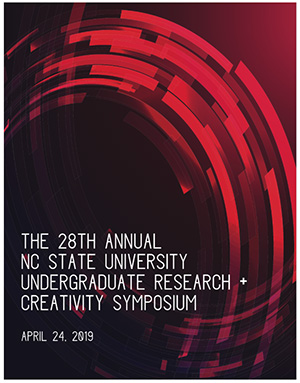CSC News
Luck, Woodlief Win Outstanding Poster Presentations
 Congratulations to Christopher Adam Luck, and Alan
Dale Woodlief on being awarded Outstanding
Poster Presentations during the 28th
Annual Spring Undergraduate Research and Creativity Symposium. More than 200 posters were presented, representing
the research work of over 400 students in each of the nine colleges at NC
State. The Symposium was sponsored by the
Office of Undergraduate Research (OUR), the Undergraduate Research Club (URClub), and the Division of Academic and Student Affairs (DASA).
Congratulations to Christopher Adam Luck, and Alan
Dale Woodlief on being awarded Outstanding
Poster Presentations during the 28th
Annual Spring Undergraduate Research and Creativity Symposium. More than 200 posters were presented, representing
the research work of over 400 students in each of the nine colleges at NC
State. The Symposium was sponsored by the
Office of Undergraduate Research (OUR), the Undergraduate Research Club (URClub), and the Division of Academic and Student Affairs (DASA).
During the Symposium, 101 presenters chose to participate in judging. Students who received top honors were invited to join Sigma Xi, The Scientific Research Honor Society. For more information about the symposium and a complete list of winners, please click here.
The project title of Luck’s poster is “Computer Compositions: Using Deep Neural Networks to Translate Melodies into Harmonies.” Luck is advised by Dr. Min Chi. The abstract follows: For inexperienced music composers, creating a harmony to accompany a melody can be a daunting task. Previous studies have used classification-based models to generate harmonies, but they are limited to producing single chords instead of chord sequences with varying rhythms. The Transformer, a sequence-to-sequence model introduced by Vaswani et al. (2017), has state-of-the-art performance in language translation tasks. In this work we propose a novel application of the Transformer that can translate complex melodic sequences into realistic, context-sensitive harmonies. The model in this study utilizes tokenized MIDI files. Input tokens indicating the tempo, velocity, pitches, and durations of a melody are translated into tokens of a corresponding harmony. While the proposed model may assist composers on its own, the process of MIDI tokenization, translation, and detokenization can be generalized to support increased musical context and variance in future applications.
The project title of Woodlief’s poster is “Mining Bicliques.” Woodlief is advised by Drs. Blair Sullivan and Andrew van der Poel. The abstract follows: Many common graph data mining tasks take the form of identifying dense subgraphs (e.g. clustering, clique-finding, etc). In biological applications, the natural model for these dense substructures is often a complete bipartite graph (biclique), and the problem requires enumerating all maximal bicliques (instead of identifying just the largest or densest). Many applications focus on the enumeration of all maximal bicliques (MBs), though sometimes the stricter variant of maximal induced bicliques (MIBs) is of interest. In this work, we present new approaches for enumeration for MBs and MIBs in general graphs, where the run time depends on how “close to bipartite” the input is. Specifically, the runtime is parameterized by the size of an odd cycle transversal (OCT), a vertex set whose deletion results in a bipartite graph. We implement all of our algorithms in open-source C++ code and experimentally verify that the OCT-based approaches are faster in practice than the previously existing algorithms on graphs with a wide variety of sizes, densities, and OCT decompositions.
The Office of Undergraduate Research supports and promotes discovery-, inquiry-, and creativity-based opportunities through mentored research experiences. Formally founded in 2002, the OUR connects undergraduate students with opportunities to conduct research, provides financial support through research and travel awards, and encourages the presentation of research on campus and around the world.
~coates~
Return To News Homepage